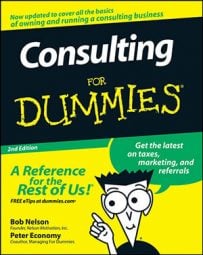Consultants face ethical dilemmas every day of the week, and as a consultant, you may be tempted to stray to the wrong side of that ethical line. But remember that you have a choice: You can do business the ethical way or the unethical way. It's that simple.
If you choose to do business the ethical way, not only will you sleep better at night, but your reputation will be enhanced and your clients will be glad that they have one less thing to worry about.
You never know who will plant an ethical land mine in your path or when it'll make its presence known. Be on the alert for the following kinds of ethical land mines:
- Conflicts of interest: A conflict of interest occurs when your personal interests or the interests of your business conflict with those of your client. An example is a government consultant who recommends that a client buy an expensive new fire-suppression system from one particular company without seeking competitive bids; unbeknownst to the client, however, the consultant is getting a kickback from the fire-suppression system manufacturer for each unit that clients buy.
- Personal relationships: When professional relationships between consultants and clients cross the line into the realm of personal relationships — particularly intimate personal relationships — ethical quicksand can't be very far away.
- Ability to do the job: Are you really qualified to do the work that your client is hiring you to do? Do you already have far too many jobs lined up to be able to adequately handle new ones? Are you going to have to subcontract the work to another consultant or firm because you're too busy to do the work yourself? Your clients hire you because they assume — either through you telling them so or through your silence — that you are able to do the work. If, in reality, you can't, you'll soon find yourself in a major ethical quandary. You and your clients should agree to any subcontracting of work before you commence work.
- Insider information: As a consultant, you discover a lot of interesting and confidential things about your clients' operations, business plans, and strategies. Misusing this information is a serious breach of ethics. If, for example, you provide information gained from working with Company A to Company A's arch rival, Company B, as a part of the work that you do for Company B, you're committing a serious ethical infraction against Company A.
- Fees and timekeeping: Are your fees reasonable? Do you keep meticulous track of the time that you work for your clients? Do you have controls to ensure that one client isn't charged for another client's work and that clients aren't billed for work that is never done (such as while you're out of town meeting with other clients or working on another client's project when you should have been working on a project for the client you just billed)? Ethical land mines abound in this dangerous area of your practice.

